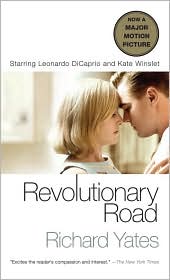
Oh. My. God. I knew from the movie previews to expect suburban malaise. However. This book is suburbian malaise and existential angst hooked up to a car battery and high on crack.
Frank and Alice Wheeler are a couple of married suburbanites, stuck in the stereotypical, Leave-It-To-Beaver 1950's; or rather, right on the outside of it, as their home is adjacent to, but not actually IN the new Revolutionary Estates development with it it's homes and cars looking "like candy and ice cream". Each fancies themselves to be more interesting and passionate than the rest of those suburbanite couples, tucked in their perfect little homes with their perfect little lives. They scoff at those content with the mediocrity of life in the suburbs and compliment themselves on being oh, so much more interesting.
It was interesting to me that the first major action of the book is that of a play being put on by a small local theater group. As the play goes, in terms of it's success, so, in a way, does the story of Frank and Alice go. They are, in fact, living a lie, a sort of play within a play that they seem desperate to break out of. There are moments of shining hope and so-close-you-can-taste-it triumphs over their lives. And there are also crashing failures and upsets, until they reach, as individuals, and a couple, their ultimate breaking points.
As we learn about each character's childhood (the author seems fascinated with the idea of psycho-analysis; there is even mention of Freud's theory of penis-envy), we begin to understand what motivates them and why they are driven to be the superbly flawed and, at times, all but unlikeable characters that they are.
The beauty of this book is the characters around Frank and Alice. The meddling, nervous real estate broker and her half-deaf (and grateful for it) husband, Helen and Howard Givings--who Frank and Alice will be if they don't bust out of this rut and strive for the greatness they feel they are capable of. Their neighbors, the Campbells, who have settled into their malaise rather than struggling against it. And perhaps most interesting, the institutionalized son of the Givingses', John, who is the only character who seems to "get" Frank and Alice.
The book starts with a quote from John Keats that is as follows: "Alas! When passion is both meek and mild." Alice and Frank are each both of these things, in turns. They're strengths and weaknesses yo-yo throughout the story, but never find a middle ground, never find one another.
I expected pages of bitter disagreement and domestic strife in the book; I've seen the advertisements for the movie in recent weeks. What I didn't expect was to see the absolute and utter dissolution of the American Dream unfold before my eyes over the past two days. I could not sleep after turning the last page. While I cannot relate in any really authentic way to either Frank or Alice, in experience or sentiment, I could not help but be shaken all the way down to a very deep place in myself when I realized that there are people out there who can, and do, relate. Much in the same way as I did after seeing the film "American Beauty" years ago, I walked around today, watching couples and looking at houses in my neighborhood and wondering, "Who are they really, and what is the true substance of their lives and their relationship?"
Next, I'll be reading something a bit more light-hearted. My brain and heart need a break after this one.


